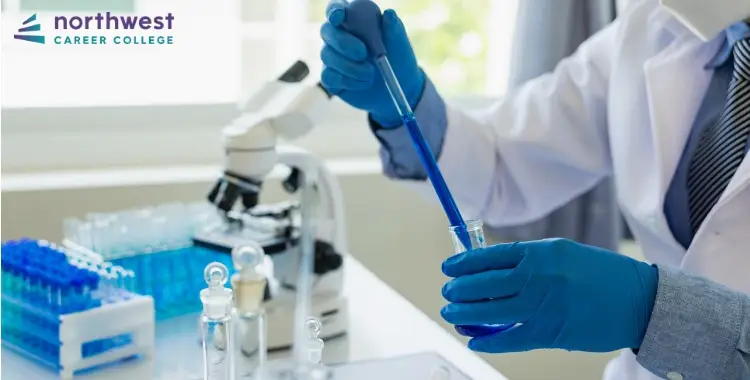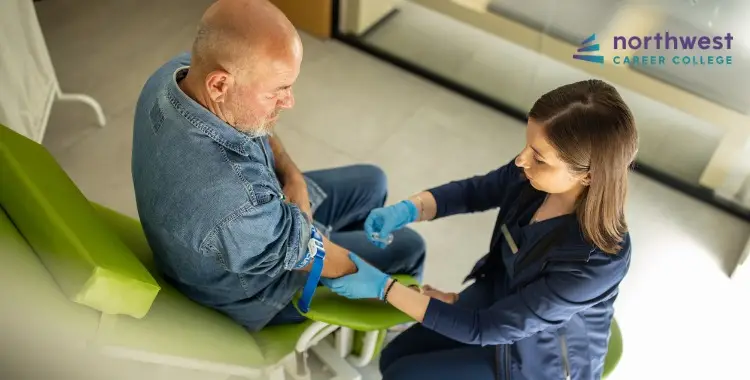The Role of a Phlebotomy Technician in Healthcare
- Phlebotomy Technician
- April 19, 2024
- 2.4k views
- 4 min read

Health care is an extensive area that involves all sorts of professionals working hand in hand to ensure patients receive the best medical attention they deserve. One such profession is Phlebotomy Technician. They draw blood samples for diagnoses, medical tests, and treatments.
For those considering a healthcare career or intrigued by the intricacies of medical procedures, understanding the unique role of a Phlebotomy Technician is both enlightening and essential. This article delves into the distinct responsibilities and significant contributions of a phlebotomy technician in healthcare.
Table of Contents
What is a Phlebotomy Technician?
Phlebotomy Technician: Any individual who can assist the medical care unit in drawing the patients’ blood meant for laboratory examination. As a Phlebotomy Technician, you will be trained to draw blood samples safely and efficiently from all kinds of patients, from babies to older adults.
You will follow strict safety procedures that minimize risks to the patient when collecting blood. Another job the phlebotomy technician does is to label and transport the blood samples to the laboratory to be tested. A Phlebotomy Technician generally becomes such an individual after training and certification. Some states, like Nevada, require licensure.
Exam Statistics
If you are considering pursuing a new career as a phlebotomist, it is essential to look at the credentialing examination success rates for any school where you are thinking about enrolling.
Statistics derived from the National Healthcareer Association (NHA) show that more students taking the Certified Phlebotomy Technician (CPT) exam will pass it the first time around than for other certification exams they offer. If the program you are considering has an examination pass rate of less than 80-85%, consider interviewing at other schools in your area.
Importance in Healthcare
Accurate Diagnosis
Blood samples can assist doctors in diagnosis. Accurate blood tests, from different cholesterol levels to screening for various diseases, might be helpful in many cases.
Patient Comfort
Few will call the experience of blood collection the most pleasant one. However, an experienced phlebotomy technician can make it less scary for patients. Their gentle approach and soothing demeanor can turn a potentially stressful situation into a breeze.
Preventing Contamination
Handling blood samples requires very calculated attention. Phlebotomy technicians are trained to use stringent protocols to maintain cleanliness and avoid the contamination of blood samples because of how critical untarnished samples are for maintaining the reliability and accuracy of the testing process.
Education and Training
So, what is it all about when one becomes a phlebotomy technician? It is not just a matter of sticking a needle into an arm and managing by chance! Here is what is involved:
- Certification: Many phlebotomy techs have specialized training programs. After training, you can pursue certification through the National Healthcareer Association or the American Society for Clinical Pathology.
- On-the-Job Training: While a classroom education can help you prepare for the field, nothing can beat real, hands-on experience. Many phlebotomy techs have extensive experience in a lab setting, participate in a school-sponsored externship, or train through on-the-job programs to get that authentic, practical experience under their belts.
- Continuing Education: Phlebotomy techs must stay updated with techniques and technology by attending workshops, seminars, and career-long continuing education.
Conclusion
In conclusion, phlebotomy technicians play an essential role in healthcare settings by providing accurate and safe blood collection and processing services to patients. They collect blood samples, label and transport them, and maintain proper documentation.
A phlebotomy technician’s venipuncture and blood handling expertise can play an important role in the diagnosis and treatment of various health conditions. Hence, it is essential to recognize their contribution and provide adequate training and resources to perform their duties efficiently.





